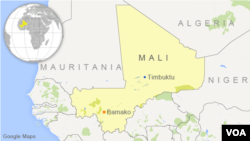One U.N. peacekeeper was killed and one wounded when gunmen opened fire on their car in Mali's capital, Bamako, on Monday.
The peacekeepers, part of Bangladesh's U.N. contingent, were driving from the airport along Bamako’s backstreets when unidentified gunmen opened fire on their car. A Bangladeshi army spokesman says one peacekeeper died on the scene while the other was rushed to the hospital.
It was the second attack within a week on U.N. peacekeepers in Bamako. Five days earlier, a gunman attacked a U.N. residence in the city's Faso Kanu neighborhood.
With more than 40 peacekeepers killed and more than 100 wounded, Mali is fast becoming home to the world’s deadliest peacekeeping mission.
Taxi driver Mahamadou Coulibaly told VOA he is not surprised the United Nations force is being targeted.
"This is a Malian problem and Malians should solve it," he said in French, adding that while he strongly condemns the attack, he is not surprised it happened. "The U.N. is not the solution — they come here to do their business and not necessarily with Mali’s best interest in mind."
While attacks in the capital are rare, militants in the north regularly target U.N. personnel. The area has seen an upsurge in attacks by pro-government militias and Tuareg rebels fighting for political influence and for control over land and trade routes.
Islamist militants have also stayed active in the region since a French-led military force ousted them from power in the region in 2013.
Amid the violence, the north has again descended into the messy clannish squabble mediators and international organizations feared when the United Nations launched its mission in Mali two years ago.
The government and northern armed groups signed a peace accord on May 15 during a ceremony in Bamako attended by several heads of state. But the main Tuareg rebel-coalition, known as the Coalition for the Azawad Movements (CMA), failed to sign the agreement, saying it did not meet their demands. This week the CMA and authorities again meet in Algiers.
While no group has claimed responsibility for the attacks on peacekeepers in Bamako, the violence comes at a time of strained relations between the government and the U.N. mission.
Last week, Malian President Ibrahim Boubacar Keita questioned the U.N.'s impartiality, and the population, after years of unrest, is growing impatient for stability to return.




